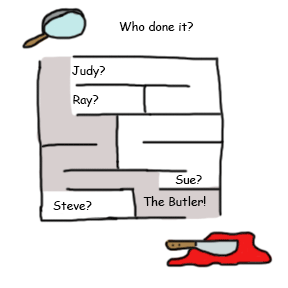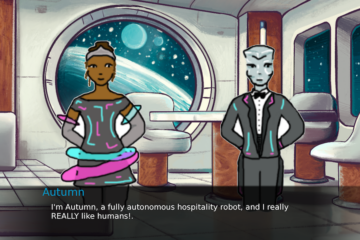In writing workshops, sometimes you find yourself with nothing to say about a particular story. It’s either so not your thing you don’t know how to improve it, or it’s just plain good already.
The dangerous temptation is to come up with something to say, anyway, something minor or weird, and it’s often at these times that the Deadly Whatabouts strike.
“Well,” says the well-meaning critic, “What about this part where you talk about the weather? Is there, like, a meteorological service in this world?”
The Deadly Whatabout is a reasonable question, exploring deeper, beyond what is in the story to its worldbuilding.
What makes a reasonable question deadly?
Revising to it.
Let me explain. Have you ever read some bad science fiction where every paragraph the author butts in with exposition? “Tommy picked up his ray-gun (it was powered by a nuclear cell battery) and put it in his (shielded with unobtanium which is light and flexible but radiation-proof) holster.”
Chances are, this poor shlaub got Whatabout’ed at his writing workshop and in response to those questions felt the reader needed to know what powered the ray gun and how Tommy kept the nuclear radiation out of his pants.
Sometimes these are useful things to know, but frequently they are unnecessary, pulling the reader off the track of the story. Every time a new subject comes up, the mind follows it.
This can be used as a tool in writing, such as giving readers blind alleys in mysteries.

Another use for not-necessarily-required information is suspense. If you need to slow the story down to let the reader twitch, by all means, stop and tell them about how the traffic signals work in this world.
But if your alleys don’t lead anywhere – if the uncertainty doesn’t pay off in the story – you can just confuse your reader and muddy the story. The explanations start to build up, like plaque, calcifying your story into something lifeless.
So how do you know when something is legitimately missing from the story or when it is just “whataboutitis”?
I have a real hard time not revising to every critique. It takes a force of will to refuse the most casual suggestion. I end up writing long, detailed explanations and scenes exposing, say, the legal ramifications of a one-liner joke. Then, after a rejection or twelve, I come to my senses and remove that.
Or, really, like all writing: draft long, edit short. The answer to that ‘whatabout’ might end up being exposed only in a single word. All worldbuilding should hit the page as a tip of an iceberg, hinting at what lies beneath the water without showing the whole bulk to the reader.
Or it isn’t important, anyway, and you answer the “What about this?” with “What about it?”


